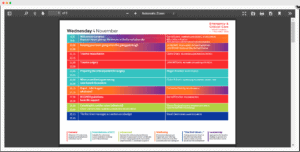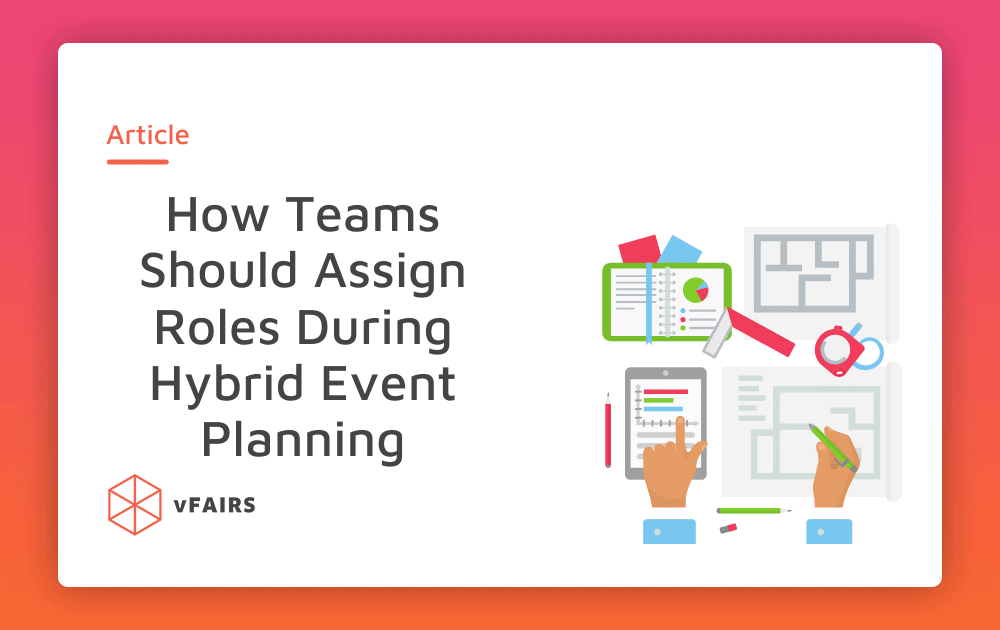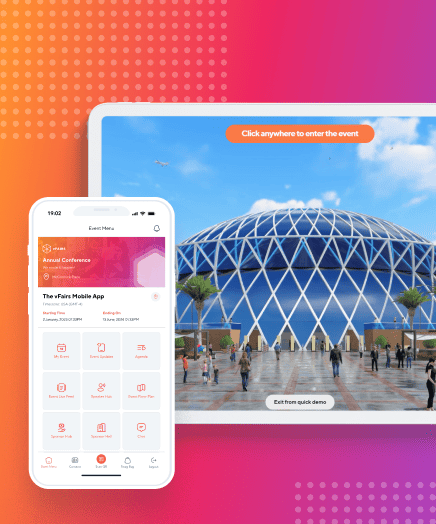Planning events using hybrid event platforms may seem intimidating to those starting out the virtual path. But if one understands the key aspects of it, the process can become fairly simplified and well worth it, considering all the benefits.
Lets see how you can effectively plan hybrid events by focusing on the essentials, assigning the right roles to your team, and managing expectations.
How Much Extra Work Is a Hybrid Event Compared to in-Person or Virtual Events?

The answer is; not a lot.
Hybrid events might seem like too much work. But a bit of research will reveal that most of it comes down to managing your teams properly and getting the right venues, both online and offline.
Now, if you can get the physical venue to coordinate with the online interface properly, half of your problems are already solved.
Let’s look at what kind of work you should expect and you can create appropriate teams and assign roles accordingly.
The Physical Venue
At the physical venue, you will need people who can make it easy for virtual attendees to be a part of it. This requires the use of cameras, microphones, and lights. Besides the tools, you will need the (physically present) team to use those tools effectively so the virtual attendees can get the best experience possible.
Camera angles, microphone positions, the lighting, all of it has to give a clean and clear image to the virtual participants. And they should be covering at least all of the most important parts of the venue. The sound is important. If the virtual participants can’t hear the presentations and events occurring at the venue, it can disrupt the virtual experience.
The Online Venue
This may be easier to manage, but the participants should also be clearly visible and audible. Meaning they should have access to a camera, mic, and some good lighting as well.
The hybrid event platform being used here will play a large role in how well the experience plays out for the virtual attendees. It should also be easy enough to use for the participants.
Besides that, smooth internet connectivity is crucial. If a participant’s connection keeps breaking, the experience will be made stressful for both sides. Interruptions like that can be a source of distraction. And they can be a waste of important time.
Now, to seamlessly merge with the real event, the online venue provider should be someone willing to work with you. They will also need to provide live support for the attendees so they don’t face any issues with the tool being used.
The event management tool should also have enough features e.g. live chat, to allow both in-person and virtual attendees to collaborate and network easily.
Do You Need a Big Team to Plan a Hybrid Team?

Actually, no. A hybrid event planning team can even be as small as 1. But that is not recommended, as it will be difficult to manage. What really matters is that you’ve assigned the roles appropriately such that the results cover all aspects of a hybrid event.
The main aspects of a hybrid event include; event setup, audio/visual management, the tool, event collateral, and moderators. If this looks too much, worry not. You don’t really need more than one person to manage each aspect, and some duties can even be shared by the team members, or just one person can perform two duties.
For instance, if you only had 1 person to plan the whole event, it’s entirely possible. Especially if he has had experience hosting and setting up online events. Has technical skills good enough to understand the tool and fix any problems faced in using it. And understands the basics of audio/visual placement.
As long as the person understands all of the aspects, he can also get extra help. And simply manage a team of delegates, assign (and scrutinize) roles according to their specific backgrounds and capabilities.
As an example, a short and simple workshop with a small but hybrid audience can definitely be managed by a single person.
What Is the Ideal Amount of People to Include in Hybrid Event Planning?

Well, this depends on the size and complexity of the event. 1 person can handle a small office-level hybrid event easily. But anything bigger than that will be difficult to manage for a single person. Trade shows, hybrid seminars, and such events will require quite a few people. They may also require roles that aren’t needed for smaller events such as producer, technologists, camera operators, and additional support.
But usually, we recommend that there be 1 person for event setup, 2 who develop event collateral, and 1 who can manage technical aspects. You can of course add more to the team to make it easier, but this is an ideal mix. Should the size of the event require camera movement, you may need one or more operators too.
Similarly, for smaller events, the technical specialist can manage all the technical aspects of the event beforehand. S/he can watch out for problems mid-event and provide support simultaneously to those who may need help.
However, if you’re using a good virtual event management software, it will most likely provide technical support for both sides. Thus, significantly reducing the workload of the tech manager.
What to Expect for Each of Your Hybrid Event Planning Roles?

The person dealing with event setup has the most important job. S/he should ideally have experience hosting both in-person and online events. Or, at least, have experience planning in-person events. As managing the virtual aspect has more to do with the event technicalities than management. So the same experience can translate over to that to an extent.
Event Planning Team
The event setup/event planning team will be responsible for bringing in the audience, deciding on the aesthetics, theme, and design of the event. They may even work with the technical specialist to finalize the tools that will be used. Event planners will also be the face of the event and will be expected to ensure the quality of it all.
The event planners will need to have solid people skills, as they will be the one deciding on the physical venue. And it’s very important that the ones in charge of the physical venue are helpful and cooperative.
They will also have to work on the time and duration of the event. They will develop a proper schedule early on for how, when, and where everything will take place in the event. Event planners will have a number of hurdles to work through and around and constraints to deal with.
Event Collateral Team
Those who are in charge of developing and managing event collateral should have the skills required to develop collateral for both in-person and virtual events. This team should be responsible for branding and marketing. Much of this involves building the visual language of the event.
They can repurpose the already existing campaign materials for the event. They can also create more resources if need be for the virtual aspect of it.
For physical venues, the team needs to create media walls, banners, backdrops, and other things that will help with the visual branding. So, that means the team needs to work closely with the designers/creative team for these reasons. They also need to figure out the collateral for social media marketing, email marketing, etc.
Technical Team
The technical team (or specialist) should understand how to migrate registration and user data. They also need to have a good understanding of all tools and platforms being used for the event. If the event requires the integration of different tools, they should be capable enough to do that.
The technical team will also need to make sure that the internet connection is stable. They should make arrangements for backup in advance so the event experience is not disturbed for the virtual participants.
Technical Support
They will be responsible for dealing with all technical queries that any participant may have. And they will have to remain alert and vigilant. If there’s only one technical specialist, they should be present on-site. Technical support is just another part of the overall technical team, but their main focus is to provide assistance to participants rather than integrating tools and managing backup responsibilities.
They will simultaneously be a part of the virtual event as well, making sure they can see what the virtual attendees are seeing.
If they find anything out of place, they can make changes mid-event. The team also needs to make sure that all of the features are working smoothly, the event collateral is shareable, and that the live chat has no issues.
Every participant needs to have access to the technical support team for the entire duration of the event. And also for some time before and after the event. That’s because the overall experience is extremely important for all the attendees, and therefore, to the success of your event.
Sound and Video Team
Lastly, the cameras and mics need to be managed as well. Both the event setup team or (the event planners) and the technical support team will play a part here. The event setup team can deal with camera placement to make sure the whole event is properly covered. Whereas the technical specialist will make sure all devices are working fine. They will need to do some testing before starting the event as well.
What Other Roles Can You Assign for Hybrid Event Planning?

What we have looked at till now are the necessary aspects of planning a successful hybrid event. However, you can assign more roles, given the size of the team and the event itself. Some of them may be more important than others in some cases. In others, they may not be important for other scenarios.
Event Managers
Having a few or even just one event manager is an obvious tool to have in your arsenal. The job of the event manager is co-ordinate all the aspects of your event. They should also hold daily sync up meetings and make sure the event is on time. The event manager will oversee all operations, and see that all the other teams are in-sync and up to schedule.
Event managers work with just about everyone. However, it is extremely crucial for them to be in sync with the event coordinators, the audio/video team, and of course, the marketing team.
Audio/Visual Experts
For complex events such as hybrid trade shows, there will be more than just a few camera angles to cover and sounds to convey. Both the audio and visual components will be at a bigger scale. You should assign these roles to a small team with the necessary expertise.
Mainly, they will be looking at whether or not every device is working properly. They will work with the technical specialist to ensure the output of the devices is getting through.
The team will also be responsible for fixing any problems related to audio and visual aspects. Working with the event planner, they will figure out the right camera angles, movements, and lighting.
Event Coordinators
If an event is incomplete without any team member, it’s the event coordinator. They will make sure exhibitors are coming and on time and have set up their booths online. They also need to make sure speakers are coming. Event coordinators are also responsible for figuring out the time slots for different sessions, speakers, keynotes, webinars etc.
An event coordinator could also be responsible for structuring the entire flow of the event. For example, they might need to set up sessions in a way that don’t feel boring or repetitive to the audience.
Moderators
Moderators ensure smooth communication between participants. They are important for webinars and Q&A sessions, which involve more streamlined 1 on 1 discussions. In some cases, other people can adopt that role temporarily. For instance, the event setup person could totally handle the role of the moderator.
Additionally, the moderators can monitor live chats and be part of virtual group discussions as well. This can help keep the environment healthy and positive. They can also encourage more participation, interaction, and collaboration between attendees on both sides. They will also have the authority to mute and remove virtual participants who act inappropriately.
When assigning the role of a moderator to anyone, it’s important to make sure that they have good communication skills and are diplomatic and considerate towards people.
Final thoughts
So, those were the esssential aspects of hybrid event planning. Now you know how you can manag with a small team to cover your bases. Team members can also try to be flexible and share their duties with each other if they’re capable of it. An event planner may be able to handle some of the technical details, whereas the technical specialist can play a role in event planning as well.
Here’s a quick summary of the roles/teams you should assign.
- Event Managers: Perhaps the most important person involved in the event. They oversee all of the teams and make sure that everyone is on schedule. In addition, they deal wiht any delays and figure out the appropriate solutions.
- Audio/Video Team: This team is essential in making sure that all the cameras, microphones, and lighting equipment are set up on time and functioning properly. They also need to figure out the right tools for the job.
- Moderators: Moderators oversee communication between participants and the speakers. They need to filter out responses/questions that are inappropriate and encourage participation. Good communication skills are vital here.
- Event Coordinators: Event coordinators are responsible for figuring out the time slots, making sure speakers are on time, and also creating the structure/flow for the event.
- Technical Team: They are responsible for handling out any technical issues, and overseeing backup operations, and making sure that connections are rock solid.
Proper delegation is paramount to successful planning but there’s more to it. Get this free ebook on the ultimate guide to a hybrid event to have a better understanding of the whole process.


